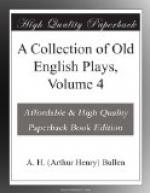[114] Not marked in the MS.
[115] “Anythinge for a quiett lyfe”—a proverbial expression: the title of one of Middleton’s plays.
[116] So I read at a venture. The MS. appears to give “Inseinge.”
[117] Not marked in the MS. In the right-hand margin is written “clere,” i.e., clear the stage for the next act.
[118] A fisgig was a sort of harpoon.
[119] “Poore Jhon” = inferior hake.
[120] This and the two following speeches are marked for omission in the MS.
[121] A nickname (from the apostle Peter) for a fisherman.
[122] A small box or portmanteau.
[123] Owns.
[124] This speech and the next are marked for omission.
[125] Fish-baskets.
[126] The rest of the speech is marked for omission.
[127] Bawd.
[128] i.e., Exeunt Palestra, Scribonia, and Godfrey: manet Ashburne.
[129] In the MS. follows some conversation which has been scored through:—
“Fisher. Yes, syrrahe, and thy mayster.
Clown. Then I have nothing at this tyme to do with thee.
Fisher. Marry, a good motion: farewell and bee hangde.
Clown. Wee are not so easly parted.—Is this your man?”
[130] The following passage has been scored through in the MS.:
“[Ashb.] Say, whats the stryfe?
Clown. Marry, who fyrst shall speake.
Fisher. Thats I.
Clown. I appeale then to the curtesy due to a stranger.
Fisher. And I to the right belonging to a ... what ere he says.”
[131] The MS. is broken away.
[132] Penny.
[133] The date has been scored through in the MS.: the number after “6” has been turned into “3,” but seems to have been originally “0.” In the margin “1530” is given as a correction.
[134] Not marked in the MS.
[135] This dialogue between Ashburne and the Clown is closely imitated from Rudens, iv. 6.
[136] The words “Nowe ... scurvy tune” are scored through.
[137] Old form of digest.
[138] The words “will for mee” are a correction in the MS. for “at this tyme.”
[139] The MS. has:—
“Hee’s now where
hee’s in Comons, wee ... ...
Heare on this seate (nay hold
your head up, Jhon,
Lyke a goodd boy), freely
discharged our selfes.”
In the first line “Hee’s now where hee’s” has been altered to “Hee’s where hee is,” and the two next lines have been cancelled.
[140] The reader will remember a somewhat similar incident in the Jew of Malta, iv. 3, and in a well-known tale of the Arabian Nights.
[141] In the left-hand margin of the MS. is written “Fry: Jo: nod.”—i.e., Friar John totters from the blow. Beneath “nod” is the word “arras,” which has been scored through.




